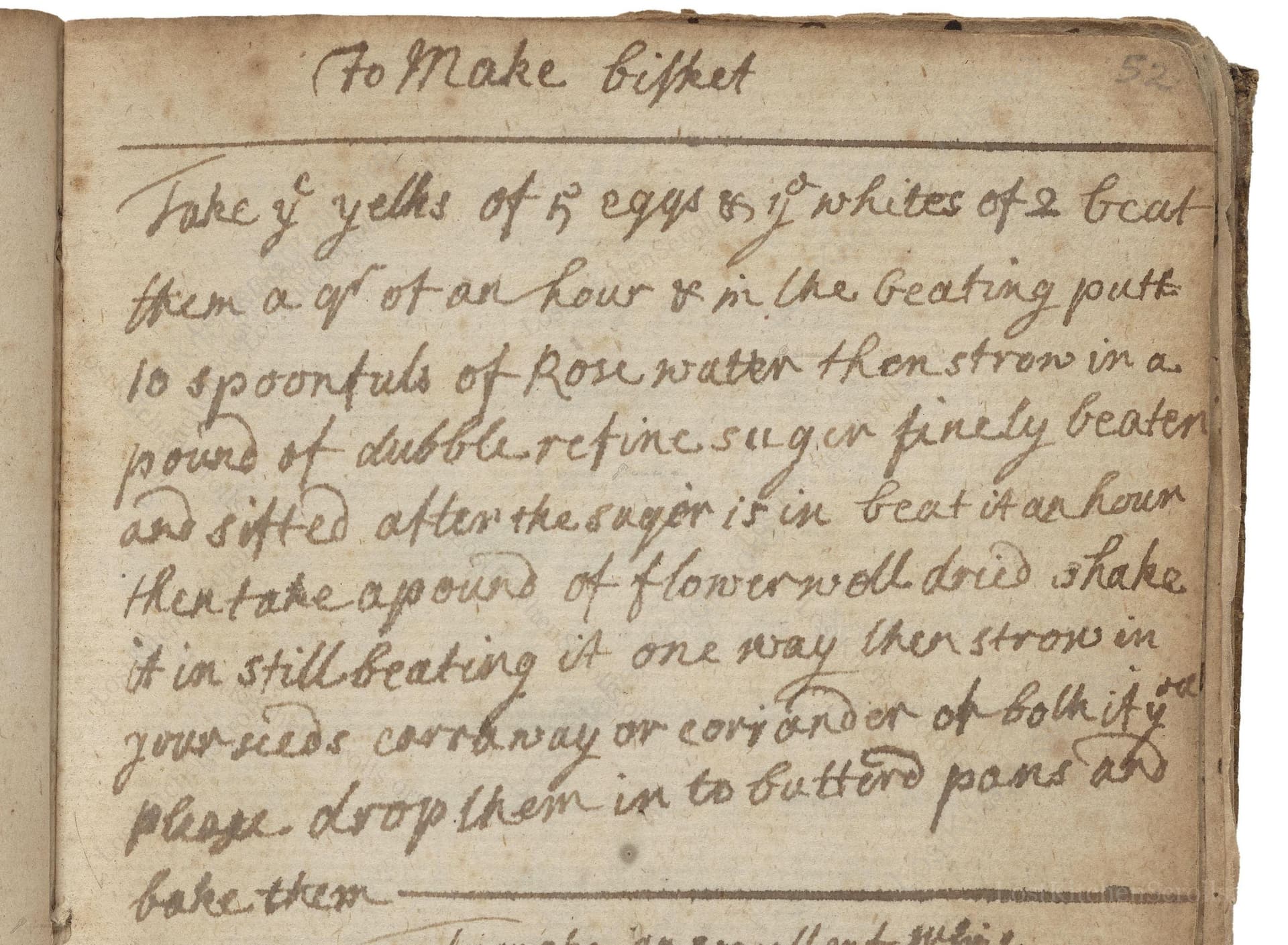To Make Bisket
From the treasured pages of Medicinal and cookery recipes of Mary Baumfylde
Written by Mary Baumfylde

To Make Bisket
"Take y° yelks of 8 eggs & y° whites of 2 beat them a q° of an Hour & in the beating putt 10 spoonfulls of Rose water then strow in a pound of dubble refine suger finely beaten and sifted after the suger is in beat it an Hour then take a pound of Flower well dried shake it in still beating it one way then strow in your seeds corrian der or carrian der or of both if yº please. drop them in to butterrd pans and bake them."
Note on the Original Text
The recipe is presented in the brisk, narrative style typical of early modern English manuscripts, assuming the reader’s basic kitchen literacy. Spelling and grammar are irregular—'y°' stands for 'the' (a scribal abbreviation), 'q°' is 'quarter,' and 'fower' is a period spelling of 'flour.' Quantities are sometimes described in kitchen spoonfuls rather than standardized measurements, and beating times are long to achieve foam and structure without chemical leaveners. Seeds like coriander ('corriander') and caraway ('carriander') are suggested as options, highlighting early modern tastes and the personalization expected of cooks.

Title
Medicinal and cookery recipes of Mary Baumfylde (1626)
You can also click the book image above to peruse the original tome
Writer
Mary Baumfylde
Era
1626
Publisher
Unknown
Background
A sumptuous journey into early 17th-century English cookery, this delightful volume offers a tantalizing glimpse into the recipes, flavors, and culinary secrets that once graced aristocratic tables. Prepare for a taste of history, presented with wit and wisdom!
Kindly made available by
Folger Shakespeare Library
This recipe for 'Bisket' hails from the mid-17th to early 18th century, attributed to Mary Baumfylde. At the time, sweet, spiced biscuits were a favored treat among the English gentry, reflective of the era’s fascination with sugar, aromatic waters, and imported spices. Recipes like this would have graced household manuscripts, passed down through generations. The lavish use of rose water and sugar signals its place among festive or special-occasion confections, a luxury of the well-off.

The original cook would have relied on large pottery or wooden mixing bowls and sturdy whisks or bundles of birch twigs for beating eggs—a laborious task before the invention of the balloon whisk or electric mixer. The sugar would have been beaten in a mortar and pestle, and flour sifted by hand, likely over muslin or fine cloth. Butter was used to grease heavy metal or earthenware pans, and the biscuits were baked in a wood-fired oven, monitored closely for doneness without the help of precise temperature controls.
Prep Time
30 mins
Cook Time
20 mins
Servings
24
We've done our best to adapt this historical recipe for modern kitchens, but some details may still need refinement. We warmly welcome feedback from fellow cooks and culinary historians — your insights support the entire community!
Ingredients
- 8 egg yolks
- 2 egg whites
- 5 fl oz rose water
- 1 lb white sugar (caster or superfine preferred)
- 1 lb plain wheat flour (all-purpose), well dried and sifted
- 1-2 tsp coriander seeds or caraway seeds (or a mixture)
- Butter, for greasing pans
Instructions
- Begin by separating the yolks of 8 eggs and the whites of 2 eggs.
- Beat these together with a mixer or whisk for about 15 minutes, gradually adding 5 fl oz of rose water as you whisk.
- Slowly sprinkle in 1 lb of finely powdered white sugar while continuing to beat the mixture.
- Once all the sugar is incorporated, beat for an additional 15 minutes until the mixture is light and airy.
- Sift and dry 1 lb of plain wheat flour, then gradually fold this into the egg mixture, keeping your strokes gentle to avoid deflating the batter.
- Add 1-2 teaspoons of whole coriander seeds (or caraway seeds, or a mix of both, as you please), scattering them evenly through the mixture.
- Drop spoons of the mixture onto buttered baking trays, shaping into rounds or ovals as desired.
- Bake at 340°F (170°C) for 15-20 minutes, until lightly golden and just set.
Estimated Calories
180 per serving
Cooking Estimates
You will need about 30 minutes to prepare the ingredients and batter, and the baking takes 15-20 minutes. Each serving has around 180 calories if you make 24 cookies.
As noted above, we have made our best effort to translate and adapt this historical recipe for modern kitchens, taking into account ingredients nowadays, cooking techniques, measurements, and so on. However, historical recipes often contain assumptions that require interpretation.
We'd love for anyone to help improve these adaptations. Community contributions are highly welcome. If you have suggestions, corrections, or cooking tips based on your experience with this recipe, please share them below.
Join the Discussion
Rate This Recipe
Dietary Preference
Main Ingredients
Culinary Technique

Den Bockfisch In Einer Fleisch Suppen Zu Kochen
This recipe hails from a German manuscript cookbook compiled in 1696, a time whe...

Die Grieß Nudlen Zumachen
This recipe comes from a rather mysterious manuscript cookbook, penned anonymous...

Ein Boudain
This recipe comes from an anonymous German-language manuscript cookbook from 169...

Ein Gesaltzen Citroni
This recipe, dating from 1696, comes from an extensive anonymous German cookbook...
Browse our complete collection of time-honored recipes



